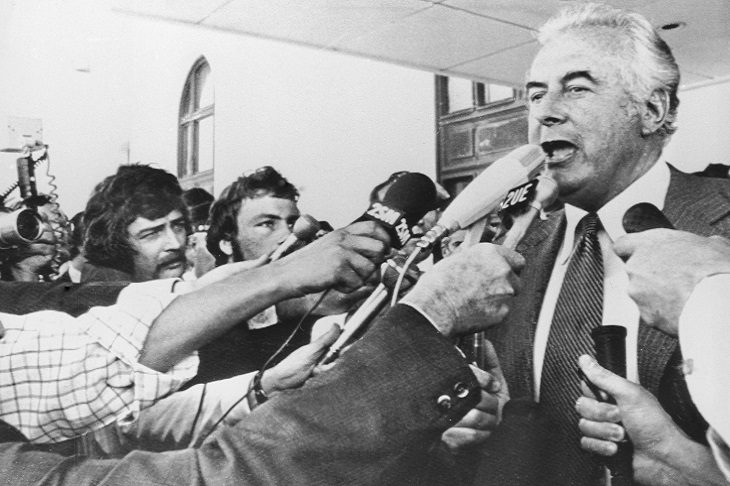
During Australia's constitutional crisis of 1975, Prime Minister Gough Whitlam addresses reporters outside the Parliament building in Canberra after his dismissal by Australia's Governor-General, 11th November 1975. Kerr named opposition leader Malcolm Fraser to lead a caretaker government until elections in December. (Photo by Keystone/Hulton Archive/Getty Images)
UPDATE: As Australia reflects on the 50th anniversary of Gough Whitlam’s dismissal, a panel at the 2025 Australians for Constitutional Monarchy National Conference has sparked urgent debates over the former Prime Minister’s legacy. The conversation, led by Professor David Flint and featuring former PM John Howard, is igniting fresh scrutiny of Whitlam’s policies and their impact on modern governance.
The discussions reveal a growing perception that Whitlam, often cast as a political martyr, was, in reality, the architect of his own downfall. “Whitlam was punished not by Sir John Kerr, but by the people at the ballot box,” stated an attendee, underscoring a narrative shift that challenges decades of historical framing.
As the conference unfolded, participants examined how the education system has shaped perceptions of Whitlam. Many students now leave schools believing he was unfairly targeted by a monarchy conspiring against him. This view, critics argue, glosses over the failures of his administration, including significant electoral defeats that are often omitted from historical discussions.
The urgency surrounding this reevaluation is amplified by contemporary political tensions in Australia. Jacinta Allan, Premier of Victoria, is pushing forward with a controversial treaty despite a clear public rejection during a recent referendum. Citizens are questioning the legitimacy of their government’s decisions and the apparent indifference to public opinion.
This discontent echoes sentiments from the Whitlam era, where grassroots movements are resurfacing amid fears of an overreaching government. Young Australians, largely disengaged from discussions about Whitlam, are expressing frustration over a political landscape that feels disconnected from their realities.
As the panel concluded, the overarching sentiment was clear: the ghost of Gough Whitlam may be fading from memory, but the lessons of his administration are more relevant than ever. The message is resonating: Australia stands at a crossroads, with potential upheaval on the horizon as new political dynamics emerge.
What happens next? Observers are closely monitoring whether the current government will heed the calls for accountability or continue its course, potentially facing backlash akin to that faced by Whitlam.
Stay tuned as these discussions evolve, shaping the future of Australian politics and the legacy of its leaders.






